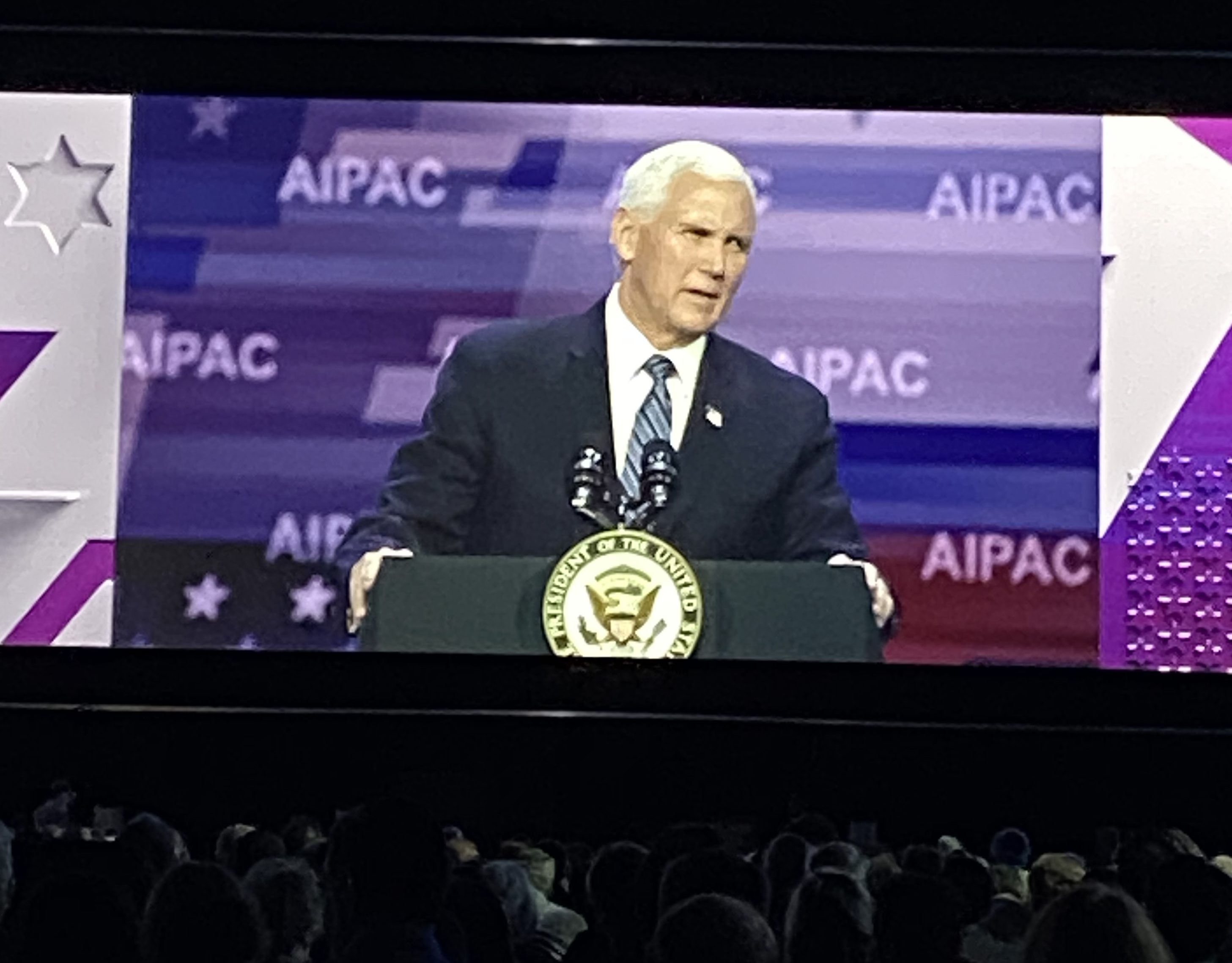 Vice President Mike Pence speaks at AIPAC 2020. Photo by Aaron Bandler.
Vice President Mike Pence speaks at AIPAC 2020. Photo by Aaron Bandler. Vice President Mike Pence said during his March 2 speech at the American Israel Public Affairs Committee (AIPAC) policy conference in Washington, D.C., that the official policy of the Trump administration is that anti-Zionism is anti-Semitism.
Pence called anti-Semitism a unique and potent evil that is on the rise worldwide, including on college campuses and in Congress.
“We must root anti-Semitism out from every part of our society,” Pence said. “It’s not just a threat to Jewish Americans and Jews around the world, it’s a threat to us all.”
Pence touted President Donald Trump’s statement after the October 2018 shooting at the Tree of Life synagogue in Pittsburgh that “America would seek the destruction of those who seek the destruction of the Jews. Never before has an American president spoken with such clarity and resolve to the wider world [on anti-Semitism].”
The vice president also pointed out that Trump signed an executive order in December addressing anti-Semitism on college campuses.
“Our message to American universities and colleges is clear: if you want billions of dollars in taxpayer support, reject anti-Semitism and reject it now,” Pence said.
Earlier in his speech, Pence provided an update on the coronavirus, stating that 48 Americans have been infected with the disease and two have died. Because the figures are fluid, other news agencies have reported as many as 100 confirmed cases.
“Keep in your prayers all of those impacted by this disease,” Pence said.
He praised Trump for suspending travel to China and establishing a task force dedicated to combating coronavirus.
“President Donald Trump has no higher priority than the health and the safety of the American people,” Pence said.
Pence also called Trump’s Israel best friend, highlighting various policies including the moving the U.S. Embassy to Jerusalem, recognizing Israeli sovereignty in the Golan Heights — both controversial decisions denounced by his critics — and the administration’s “maximum pressure campaign” against Iran to stop supporting terror proxies in the Middle East.
“We truly hope for a better and more prosperous future for the people of Iran,” Pence said.
The vice president highlighted the U.S. killing Iranian Maj. Gen. Qassem Soleimani in a precision airstrike in Baghdad in January, and criticized Sen. Bernie Sanders (I-Vt.), the current Democratic presidential candidate, for describing Soleimani’s killing as “assassinating a government official. Soleimani was not some government official, he was a terrorist and President Trump was right in taking him down. That’s what leadership looks like.”
Pence warned that bipartisan support for Israel in the United States “is beginning to erode in one of America’s two major political parties,” pointing to Sanders’ recent criticisms of Israel and AIPAC.
“Those who side with Israel’s enemies must never be allowed to call themselves friends of Israel,” Pence said. “It is wrong to boycott and slander Israel, it is wrong to boycott and slander AIPAC.”
He concluded his speech on a note of optimism, saying: “I know the best days for Israel and the United States of America are still to come.”
The progressive feminist group Zioness criticized Pence’s speech in a statement.
“Today, the Vice President of the United States told us we must check our liberal and progressive values — our commitment to social, racial, economic and gender justice in America — at the door if we want to be ‘good’ Jews,” the statement read. “The implication in Pence’s comments was that the ‘good’ and ‘strong’ Jews — the Jews who are willing to fight antisemitism and its modern incarnation, anti-Zionism — must vote a certain way. This isn’t an echo, but a partisan mirror, of the suggestion in spaces in the left that divide ‘good’ Jews from ‘bad’ Jews based on their willingness to check their Jewish and/or Zionist identities at the door in order to fight for the rights of other marginalized communities.”























 More news and opinions than at a Shabbat dinner, right in your inbox.
More news and opinions than at a Shabbat dinner, right in your inbox.